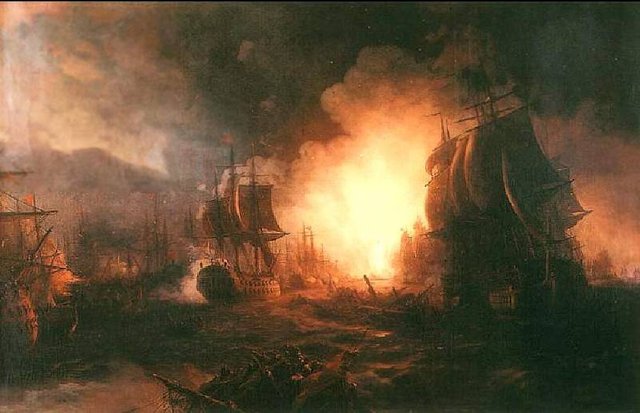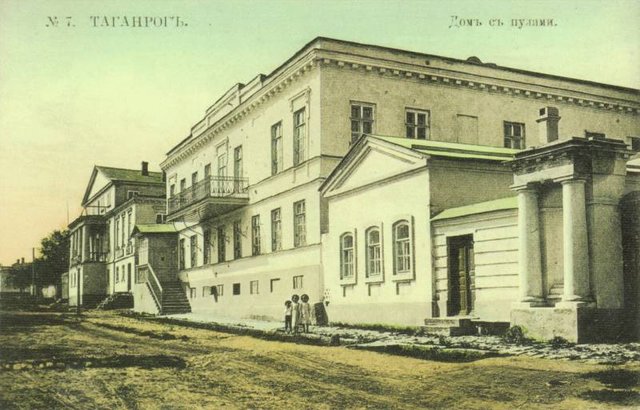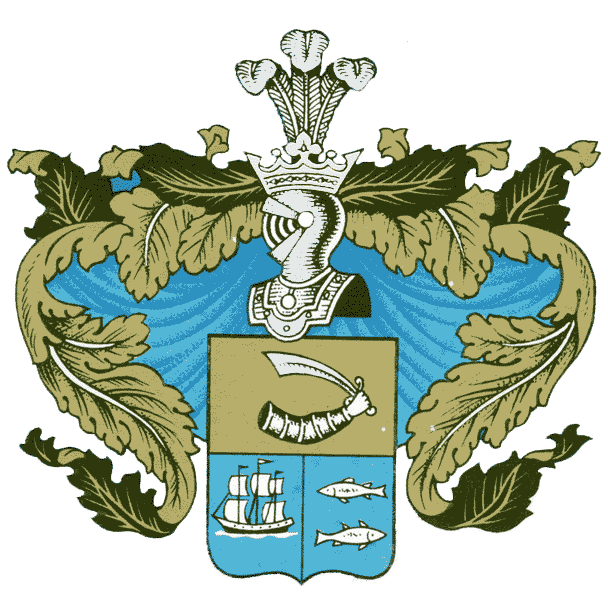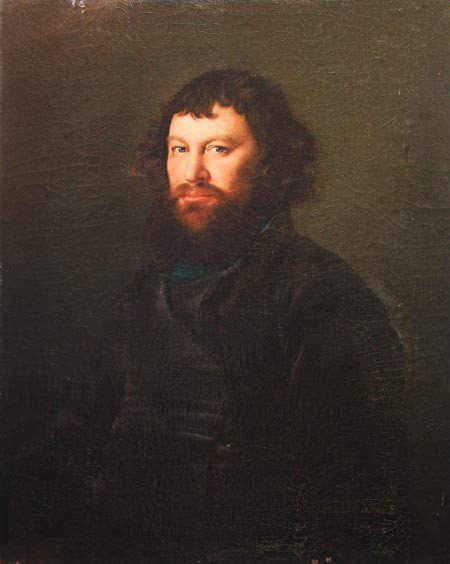Ivan Andreevich Varvakis — former pirate and merchant in the service of the Russian Empire
One of the first of the pirates, have fallen in the service of the Russian Empire, was a Greek Varakis Ioannis (Ioannis Andreas Leontidis). He was born on the small Greek island of Psara, where the great Homer once lived and worked. His father earned a living by transporting various cargoes on his small ship to the mainland. Ioannis quickly learned seamanship, and by the age of 17 he began to manage his father's ship plied the seas.

Astrakhan merchant and philanthropist
The love of sailing in young men, was in the blood. He was not just Maritime trade but also learned a martial art. In those days in the beginning of the eighteenth century to good and to trade successfully ought to be a real warrior, learn Maritime skills and military Affairs. Young Leontidis enjoyed great prestige among the sailors, knew how to tame the shrew and rollicking sailors, and for 35 years was known as the famous pirate, nicknamed Varvakis ("holding force with influence"), it later became his surname.
Head Varvakis many Turkish sultans were promised a reward. However, beginning in 1770 Archipelago expedition of the Baltic fleet of Russia Varvakis be allowed to join with his ship to the Russian squadron under the command of count Alexei Orlov and Admiral Grigory Sviridov, and in such good company to find it was not so easy.
In those years, in the service of the Russian Navy, there were more than 2,000 natives of the Balkan Peninsula. And after the famous battle of Chesma in 1770, when he decided to blow up his ship, full of gunpowder, and decide the outcome of the battle. The fire immediately spread to other enemy ships and the whole Bay was engulfed in flames.

the battle at Chesma Bay
Turkish fleet in the Aegean sea was destroyed, and brave man Jan began to serve the Russian state. He took part in blocking the Dardanelles, and in patrolling the entire Balkan coast, and participated in many battles of the Eastern Mediterranean. Together with his brave crew on his own twenty-vessel, he seized many of the cargo destined for the Ottoman Empire. In those years, many Greek captains received Russian patents for cruising and captivity in the waters of the Mediterranean.
After 2 years, the young sailor was awarded the rank of Lieutenant, as evidenced in one of his decrees the Empress herself:
...Known Yes everyone knows that we served in the last war, when Our fleet of the Greeks, Jan Vorbach for its rendered in the service of Our zeal and diligence in Our Lieutenant 1772, October 21 day vsemilostivogo granted.
One of the combat scenes of those years with the participation of Varvakis mentions the famous historian of the Russian fleet A. Sokolov. He writes about how in the spring of 1744 during the usual hike to the Dardanelles was planted a small landing with the frigate "Glory" in the Chios Strait.

picture of Ivan Aivazovsky "Fight in The Chios Strait"
And the frigate was commanded by a longtime friend Varvakis - count Marko Voynovich Balkan Slav, which entered service in the Russian army together with Ioannis in 1770. At the same time and landing was among the 130 ipsarion under the command of Wallace. From "Notes of the Hydrographic Department in 1849," we learned about taking them to a battery with four guns.
After the end of the Russo-Turkish war (1768-1774) years Varvakis, at the call of the Empress herself moved to The Russian Empire, received some benefits that were provided to all Greek immigrants (they were exempt from paying all kinds of taxes for 20 years). Although the amount was quite small (each of the immigrants received only 12 rubles), but the food was given for the whole year.
The Russian government also transferred fishing factories to the Greeks and granted the right to trade throughout the Territory of the Russian state without any restrictions. Allocated land at fortresses Kerch and in the future Yalta County, and later near Taganrog.

Varvakis house in Taganrog
Varvakis was awarded a personal meeting with Catherine II. However, the former Greek Corsair that warm welcome from the Empress organized Gregory Potemkin. He also had a great influence on the future of the young Greek.
In those days, by order of Grigory Potemkin on the Black sea began to issue the first kapersky patents. The Russian government tried to allocate privateers weapons and supplies, they were paid a decent salary, were awarded to the captains of such vessels, the high officer ranks. This was due to the fact that in those years, many domestic shipowners were not sufficiently provided, and some are just poor. At that time prohibition was in effect for private individuals to own guns and cannons.
The brightest Prince Grigory Potemkin also decided to offer temperamental Varvakis to master the Astrakhan province, having appointed it in 1776 the Governor-General of huge grounds on coast of the great Russian river Volga. In Astrakhan to this day there is a monument to the knight of the orders of St. Vladimir of IV degree and the order of St. Anna, patron Ivan Andreevich Varvatsi, who made a huge contribution to the development of the city. Soon to the former Greek pirate the noble coat of arms with the diploma on nobility was granted also.

Varvakis coat of arms
It was a beautiful time. Subsequently Varvakis to the relatives often told as received from hands of the Empress confirmation of the officer patent and 1 thousand chervonets together with the right of duty-free trade in the Astrakhan province for a period of 10 years.
Thus, the life of the glorious Greek on the steppe windy expanses of Astrakhan lands began. Although in the first years of its Governor Varvakis had to perform military and diplomatic functions. He participated together with the fighting companion (Marko Voynovich) in various expeditions on creation of the Russian factor on the southern coast of the Caspian sea.
They organized and thought out profitable trade routes to the coast of Persia, rented large fishing vessels on the Caspian sea, engaged in fishing, sold black caviar to overseas merchants and rich people.
By the end of XVIII century Varvakis became the main merchant of Astrakhan caviar in the whole black sea region. He exported from Astrakhan and Rostov-on-don, Taganrog Volga black caviar in huge batches, he managed to earn a year for half a million rubles on delicious Astrakhan product.

portrait Varvakis brush of Vladimir Borovikovsky
The Turks were forced to send their ships to fight the Russian-Greek fleet, but most of the ships did not return to their Homeland, they were taken on Board, they crashed, drowned and died in the waters of the Aegean sea. And Catherine was always amazed at the success of his privateers, and later, even have commanded you "bring this fleet into its own service... pay all costs and maintenance thereof".
And at the beginning of 1789 for success in economic development of the Caspian region now Ivan Andreevich Varvatsi received the Russian citizenship, a rank of the yard adviser and hereditary nobility. It is now called the master of the court Advisor and bowed at the feet, and the black sea fleet of these brave and courageous Greek captains gradually formed the Russian fleet, and the Greeks became loyal subjects of our state.
Quite soon Varvakis was able to make a decent capital and engaged in charity. It is known that Varvakis spent more than 4 million rubles for charitable and socially useful Affairs, and about 2 million rubles sent in favor of the native small Greece.
In Astrakhan thanks to it the new city channel which was named in his honor Varvatsievsky was constructed also.
channel view
At his expense, and erected a high Cathedral bell tower, built a large hospital for 50 people, Tikhvin Church. And in 1812 they were sent decent money to arm the Russian army, fighting with Napoleon.
In his honor, a monument was erected in Athens, and a few years ago the Greek Director Yannis Smaragdis made an interesting adventure film "Pirates of the Aegean" about the unusual fate of this extraordinary man.
This man's name has been included in many encyclopedias. Sometimes it is written as a lucky merchant and generous philanthropist, sometimes celebrate his achievements during the Russo-Turkish war and captivity. However, many historians also remember his extraordinary entrepreneurial talents, the ability to stand out from the turbulent events and bright destinies of Russia in the second half of the XVIII and the first quarter of the XIX century.
Varvakis conquered not only the sea, but also human hearts, was one of the richest people in Russia, but still decided to return to their historic homeland. And already in 1823 he began to actively fight the destructive Ottoman yoke in his little beloved Greece.
really its a historical post.good work in the artical.tnx
Thanks